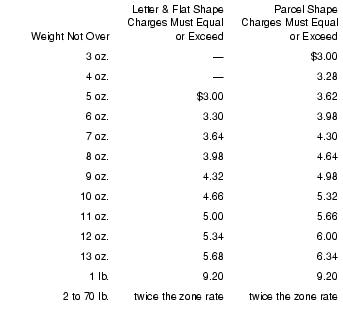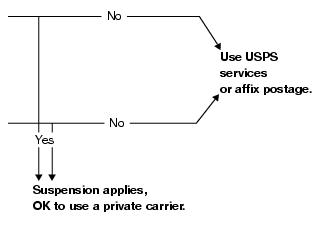Quick Service Guide 608
Basic Standards for All Mailing Services
Private Express Statutes
May 2007
Printer-Friendly PDF
What are the Private Express Statutes? (608.5.0)

The Private Express Statutes are a group of laws under which the U.S. Postal Service (USPS) has the exclusive right, with certain limited exceptions and suspensions, to carry letters for compensation. The Statutes are based on the provision in the U.S. Constitution that empowers Congress "to establish Post Offices."
What is the purpose of these Statutes?

Congress enacted the Statutes to protect the USPS and thereby enable it to fulfill its mission of providing mail service to all parts of the country at uniform rates. The Statutes enable the USPS to fulfill its responsibilities by preventing private courier services from competing selectively with the USPS on its most profitable routes.
What is a letter?

For the purpose of the Private Express Statutes, a letter is defined as a message directed to a specific person or address and recorded on a tangible object. A more complete definition can be found at title 39, Code of Federal Regulations (CFR), 310.1.
What do the Private Express Statutes require?

The Statutes provide that letters may be transported outside the U.S. Mail system only if one or more of the exceptions or suspensions apply, or appropriate postage is paid. The basic prohibition is against private carriage of letters for other persons without payment of postage.
Are there any exceptions to the Private Express Statutes?

The law allows for the private carriage of letters under certain circumstances, including letters:
- Sent with and relating in all substantial respects to the cargo that they accompany.
- Carried by the senders or recipients or their regular, salaried employees.
- Carried by private hands without compensation.
- Carried by special messenger on an infrequent, irregular basis for the sender or addressee.
- Carried to or from a postal facility prior or subsequent to mailing.
For example, an individual may transport without restriction his or her own letters, or a company its own letters (but not those of a parent or subsidiary) if it uses its regular salaried employees as couriers. Contract couriers would not qualify under this exception to the Statutes.
More information regarding exceptions and suspensions to the Private Express Statutes is available in 39 CFR 310.3 and 320. In addition, the USPS has suspended the Private Express Statutes for extremely urgent letters (see below).
What is an extremely urgent letter as defined by the Private Express Suspension?

Certain extremely urgent letters may be carried by means other than the USPS and without the payment of postage. To ensure that this provision is not open-ended, two tests of urgency are prescribed. If either of these tests is met, the suspension applies:
(1) The letter's value or usefulness will be lost or greatly diminished if not delivered within specific urgent time limits, and the private carrier meets that time limit. Specifically, the time limit for this test for letters dispatched before 12 noon and within 50 miles of the intended destination is delivery within 6 hours or by the close of the addressee's normal business day. Delivery of letters dispatched within the same distance after 12 noon and before 12 midnight must be completed by 10 a.m. on the addressee's next business day. For letters sent more than 50 miles, delivery must be completed within 12 hours or by noon of the addressee's next business day.
— or —
(2) It is "conclusively presumed" that a letter is extremely urgent if the amount paid for the private carriage of the letter is at least $3.00 or twice the applicable First-Class Mail rate (including Priority Mail), whichever is greater.
Examples of how these tests apply are on the reverse.
|
Criteria for Extremely Urgent Letter Suspension of Private Express Statutes
|
|
(1) Will the letter lose its value or will its usefulness be greatly diminished if it is not delivered within the applicable time limits as described in (1) on the reverse, and will the private carrier complete delivery within the applicable limit?
— or —
(2) Is the cost of private carriage at least $3.00 or twice the applicable First-Class Mail rate (including Priority Mail), whichever is higher?
| |
|
|
|
|
Suspension Applies
The headquarters of a city police department each night compiles a list of the license plate numbers and descriptions of automobiles reported stolen within the metro area during the previous 24 hours. This list is delivered by 7 a.m. the following day to each of the local precinct offices located throughout the city. By 9 a.m. that day, the list is circulated for use by law enforcement units operating from each office. Effective police recovery of stolen vehicles depends upon having this information handed out in written form to all units on at least a daily basis. The private carriage of these lists would qualify under the urgent letter rule.
A health maintenance organization (HMO) operating its own hospital, clinics, and medical laboratory daily sends test samples and specimens from the HMO's hospital and clinics to its medical laboratory in a different location for immediate analysis. In return, the HMO laboratory sends to the HMO's hospital and clinics the laboratory reports for these samples and specimens on the day that the reports are completed. The reports are then promptly utilized by the hospital and clinics as part of the regular diagnostic procedures. The private carriage of these reports would qualify under the urgent letter rule.
See 39 CFR 320.6 for more examples.
|
Suspension Does Not Apply
The same police department headquarters also from time to time distributes memoranda for advising the local precinct officers on departmental policy and vacation schedules and for responding to inquiries from the local precinct offices. Nothing substantial turns on whether these memoranda arrive by 12 midnight or by 10 a.m. of the next business day or whether their transmission takes a day or more longer to complete. The private carriage of these memoranda would not qualify under the urgent letter rule, unless the private carrier charges the greater of $3.00 or twice the postage for each piece.
The same HMO's hospital and clinics send requisitions and invoices to the HMO's central office as the need arises for the ordering and payment for goods and services, which are handled centrally. Every other Friday, the central office sends to the hospital and clinics reports and memoranda on expenditures for personnel, supplies, utilities, and other goods and services. Nothing substantial turns on whether these materials arrive the same day or by 10 a.m. of the next business day or whether their transmission takes a day or more longer to complete. The private carriage of these reports and memoranda would not qualify under the urgent letter rule, unless the private carrier charges the greater of $3.00 or twice the postage for each piece.
|
Back to Top
|







